The Iliad (Penguin Classics) Read online
Page 15
So she spoke, and Helen, child of Zeus, was terrified. She wrapped herself up in her shining white robe and went off in (420) silence. Not one of the Trojan women saw her go: she had a protecting divinity to guide her.
When they reached Paris’ superb house, the waiting-women in attendance at once turned to their tasks while Helen, goddess among women, went to her lofty bedroom. There the goddess herself, laughter-loving Aphrodite, picked up a chair, carried it across the room and put it down for her in front of Paris. Helen, daughter of Zeus who drives the storm-cloud, sat down on it but refused to look her husband in the face and attacked him:
‘So you are back from the battlefield – and I was hoping you had fallen there to the mighty warrior who was once my (430) husband! You used to boast you were a better man than warlike Menelaus – a finer spearman, stronger in the arm. Go and challenge him to fight again, then! But if you take my advice, you will think twice before you offer single combat to auburn-haired Menelaus – or you may end by falling to his spear.’
Paris replied and said:
‘My dear, don’t say such hurtful things about me and my courage. Menelaus has just beaten me, with Athene’s help. But (440) I too have gods to help me and next time I shall win. Come, let us go to bed together and enjoy the pleasures of love. Never has such desire overwhelmed me, not even in the beginning when I carried you off from lovely Lacedaemon in my seafaring ships and spent the night making love to you on the isle of Cranae – never till now have I felt such desire for you, or has such sweet longing overwhelmed me.’
He spoke, and made a move towards their elaborate bed, leading her to it. His wife followed him, and there the two lay down together.
Meanwhile Menelaus was prowling through the ranks like a (450) wild beast, trying to find godlike Paris. But not a man among the Trojans and their famous allies could point him out to warlike Menelaus. Not that, if anyone had seen him, they would have hidden him out of friendship. They loathed him, all of them, like black death. Then Agamemnon lord of men spoke to them:
‘Trojans, Greeks and allies, listen to me. Menelaus has clearly won. Now give up Helen from Argos and all her property (460) and make compensation on a scale that future generations will remember.’
So spoke the son of Atreus, and the Greeks all applauded.
4
THE OATH IS BROKEN AND BATTLE JOINED
The fighting starts in this book (see p. xxxiv) . When battle is joined, the warrior advances to battle in a two-horse chariot driven by his charioteer. He fights from his chariot, or dismounts to fight on the ground with the chariot in close attendance. He fights mainly with the spear, either ‘hitting’ with a throw from long range, or ‘stabbing’ from short range.
Two types of battle are distinguished: the standing fight, when both sides advance and retreat, and the ‘panic’ or ‘rout’, when one side turns tail and runs for it. Homer carefully indicates what stage the battle is at; for example, when one side is on the retreat, they die from wounds in the back. The general mass of warriors fighting on foot receives only occasional background mention. Battle encounters are dramatic and highly charged moments. They attract a large number of similes, which seem to cluster at such points (see p. xxxvii).
1–72: ZEUS wonders whether HERA and ATHENE would agree to making peace between the Greeks and Trojans. The goddesses, who hate the Trojans, refuse, and ATHENE descends to restart the fighting.
73–219: ATHENE persuades the Trojan archer Pandarus to shoot Menelaus. ATHENE herself takes care to deflect the shot, so that it only grazes him.
220–421: Agamemnon surveys his troops, praising Idomeneus, Ajax, Teucer and Nestor, but rebuking Menestheus, Odysseus and Diomedes.
422–544: Battle is joined. APOLLO and ATHENE urge on the two sides.
The gods, meanwhile, had sat down in assembly with Zeus on Olympus’ golden floor. Lady Hebe served them with nectar, and they drank each other’s health from cups of gold as they looked out over the Trojans’ town.
Zeus son of Cronus now tried to irritate Hera by needling her, though he did not really mean what he said:
ZEUS proposes Ilium’s survival; HERA disagrees
‘Two of the goddesses are on Menelaus’ side – Hera from Argos and Athene from Alalcomenae. But they are happy just (10) to sit up here and watch; whereas laughter-loving Aphrodite is always at Paris’ side, shielding him from death. Only a moment ago she whisked him off when he thought his end had come. Nevertheless, victory has certainly gone to warlike Menelaus, and we should now consider what to do next. Are we to stir up evil war again, with all the sound and fury of battle, or shall we make peace between the two sides? Subject to your approval, this would mean that lord Priam’s town would survive, and Menelaus take Helen back ...’
(20) So he spoke, and Athene and Hera muttered darkly to each other. They were sitting close together, plotting trouble for the Trojans. Athene held her tongue and said nothing, but glared at Father Zeus, seething with indignation. Hera, however, could not contain her rage and spoke out:
‘Dread son of Cronus, what are you suggesting now? How can you think of making all my efforts count for nothing, the pains I took, the sweat that poured from me as I toiled round in my chariot and gathered the army to make trouble for Priam and his sons? Do what you like, then: but not all the rest of us gods will approve.’
(30) Angrily, Zeus who marshals the clouds replied:
‘You are impossible! What injury can Priam and his sons have done you, to account for the vehemence of your desire to sack the well-built town of Ilium? You would satisfy your rage only if you stormed through the gates and long walls and ate up Priam, his children and the rest of the Trojans raw. Act as you see fit. I don’t wish this difference of ours to develop into a serious breach.
‘But I will tell you something else, and you bear it in mind. (40) When it is my turn to desire the sack of a town and I choose one where favourites of yours are living, make no attempt to curb my anger, but let me have my way, since I have given in to you this time of my own accord, though much against my inclination. For of all the towns that mortal men live in under the sun and starry sky, I prized sacred Ilium closest to my heart, with Priam and the people of Priam of the good ash spear. My altar never lacked its share of generous offerings, libations of wine and the fat from burnt sacrifice, the honour that gods have been granted as our right.’
(50) Ox-eyed lady Hera replied:
‘The three towns I love best are Argos, Sparta and Mycenae with its broad streets. Sack those, whenever they incur your hatred. I shall not make a stand on their behalf nor begrudge them to you. But even if I do object and refuse to permit their destruction, I shall achieve nothing – you are far too strong for me. And yet my efforts must not count for nothing, because I too am divine, and our parentage is one. Further, among all the (60) daughters of sickle-wielding Cronus I take precedence in two respects – because I am the eldest by birth, and also because I am your acknowledged wife and you are lord of all the gods.
‘However, let us yield to one another in these matters, I to you and you to me. The rest of the immortal gods will then follow our example. Now immediately instruct Athene to visit the Trojan and Greek battle lines, and try to arrange for the Trojans to be the first to break the oaths made with the proud Greeks.’
So she spoke, and the Father of men and gods complied. At once he spoke to Athene with winged words:
(70) ’Off with you immediately to the Trojan and Greek battle front, and try to arrange for the Trojans to be the first to break the oaths made with the proud Greeks.’
With these words he encouraged Athene, who had already set her heart on action. She came swooping down from the heights of Olympus like a meteor that Zeus, son of sickle-wielding Cronus, discharges as a warning to sailors or to some great army on the land: blazing, it shoots out a mass of sparks. That was how Pallas Athene looked as she sped to earth and leapt in (80) among the troops. The horse-taming Trojans and Greek men-at- arms were awe
-struck at the sight. They looked at each other and said as one man:
‘This means dreadful war and all the sound and fury of battle are on us again, or Zeus, controller of war on earth, is to make peace between us.’
So Greeks and Trojans talked. Meanwhile Athene disguised herself as a man and slipped into the Trojan ranks in the likeness of Laodocus, a mighty spearman. She was trying to find godlike Pandarus and she found him, the handsome and (90) mighty son of Lycaon, standing there beside the powerful shield-bearing force that had come under his command from the River Aesepus. She went up to him and spoke winged words:
ATHENE tells Pandarus to shoot at Menelaus
‘Pandarus, shrewd son of Lycaon, you should do what I say. If you could bring yourself to shoot a flying arrow at Menelaus, you would cover yourself in glory and put every Trojan in your debt, lord Paris most of all. He would be the first to come forward with splendid gifts, if he saw Menelaus warlike son of Atreus brought down by a shot from you and laid out on the sad funeral (100) pyre. Come, shoot at illustrious Menelaus and promise the renowned Lycian-born Archer-god Apollo an impressive offering of first-born lambs when you get back home to sacred Zeleia.’
So spoke Athene, and she persuaded the fool. Then and there he unsheathed his polished bow. It was made from the horns of a full-grown wild goat that he himself had shot in the chest. He had been lying in wait for the animal and hit it as it emerged from its rocky hiding place; there it fell, on its back. The horns (110) on its head, measuring over a metre across, had been prepared by a craftsman in horn who fitted them into the wooden bow-stave, made it all smooth and put a golden hook for the bowstring at the end.
Pandarus then placed the bow firmly against the ground, bent and strung it, while his brave troops surrounded him with their shields to protect him from attack by the warlike Greeks before he could get a shot at Menelaus. Then he took off the lid of his quiver and picked out a feathered arrow, as yet unused, black pain concealed within it. He quickly fitted the sharp arrow to the string and promised the renowned Lycian-born (120) Archer-god Apollo an impressive offering of first-born lambs when he got back home to sacred Zeleia. He notched the arrow into the ox-gut string, gripped it by the end and drew it back, till the string was touching his chest and the arrow’s iron tip lay alongside the bow. When he had bent the great bow into a circle, it gave a crisp twang, the string sang out, and the sharp arrow leapt into the air, eager to wing its way into the enemy ranks.
ATHENE protects Menelaus
But the blessed immortal gods did not forget you, Menelaus, and first of these was the war-leader Athene, daughter of Zeus, who took her stand in front of you and warded off the piercing missile, (130) turning it away just so much from your flesh, like a mother brushing a fly away from her gently sleeping child. With her own hand she guided it instead to where the golden buckles of the belt fixed together and the body-armour overlapped. So the sharp arrow struck the fastened belt. It punched through this ornate belt and drove on through both the richly worked body-armour and through the kilt that Menelaus wore as a last line of defence against flying weapons. This did more than all the rest to save him, though the arrow did penetrate that too. In the (140) end the arrow just grazed his mortal flesh, and at once the dark blood came flowing from the wound.
As a woman from Caria or Maeonia stains ivory with purple dye to make a cheek-piece for a horse; it is put in store, and every charioteer prays to see it on a horse of his; but it is in store to delight a ruler, as an adornment for his horse and badge of honour for his charioteer – so, Menelaus, blood stained your handsome thighs and shins and ran down to your fine ankles.
Agamemnon lord of men shuddered when he saw the dark (150) blood streaming from the wound. Warlike Menelaus himself shuddered too, though when he saw that the arrow-head and its bindings had not sunk in, he recovered his composure. But lord Agamemnon gave a deep groan, as did his men, took Menelaus by the hand and said:
Agamemnon laments Menelaus’ wound
‘My dear brother, it was your death, then, that I swore to when I took the oath and sent you out alone to fight for us against the Trojans, who have shot you now and trampled on the sacred oaths. But oaths sealed by our right hands and solemnized with libations of wine and the blood of lambs cannot have been sealed in vain. (160) Olympian Zeus may postpone the penalty, but he exacts it, in full, in the end, and oath-breakers pay a heavy price – they pay with their own lives and their wives’ and children’s too. But deep in my heart I know well the day is coming when sacred Ilium will be destroyed, together with the people of Priam and Priam himself of the good ash spear. Zeus son of Cronus, from his high throne in Olympus where he lives, will himself shake out the dark aegis of destruction over all of them in his anger at this perjury of theirs. All this will happen without fail.
(170) ’Yet if you die, Menelaus, if your life has really run its destined course, how bitterly I shall lament you. And what a storm of criticism I would face on my return to dusty Argos! For the Greeks will at once be set on getting home. We should be forced to abandon Helen here for Priam and his men to boast over, while the earth would rot your bones as you lay here in Troy, the site of your failed mission. Some arrogant Trojan will jump up and down on the tomb of illustrious Menelaus and say ‘‘May every quarrel picked by Agamemnon end like this – a failed (180) expedition, retreat in empty ships and brave Menelaus left behind!’’ That is how they will talk – and I shall pray for the broad earth to swallow me.’
Auburn-haired Menelaus comforted him and spoke:
‘Put your mind at rest and don’t alarm the men. The sharp arrow did not reach a vital spot. Before it got so far, it was stopped by my metal belt, the body-armour underneath and the kilt which bronze-smiths made for me.’
Lord Agamemnon replied and said:
(190) ’If only you are right, dear Menelaus! But a healer will treat the wound and apply herbs to relieve the pain.’
Machaon is called to heal Menelaus
He spoke and addressed Talthybius the godlike herald:
‘Talthybius, fetch Machaon here as quickly as possible, son of the matchless healer Asclepius, to see Menelaus. Some Trojan or Lycian archer who knows his business well has hit him with an arrow: glory for him, grief for us.’
So he spoke, and the herald heard, complied and made his (200) way through the ranks of bronze-armoured Greeks, searching for the warrior Machaon. He found him standing with his men, the powerful shield-bearing force that had come under his command from Tricce where the horses graze. He went up to him and spoke winged words:
‘Quick, Machaon, son of Asclepius, lord Agamemnon has sent for you to see Menelaus. Some Trojan or Lycian archer who knows his business well has hit him with an arrow: glory for him, grief for us.’
So he spoke, and his words went straight to Machaon’s heart. He set off through the ranks of the great Greek army. When (210) they reached the spot where Menelaus lay wounded, with all the commanders gathered round him in a circle, Machaon took his place in the middle and at once extracted the arrow from the close-fitting belt, though the pointed barbs broke as the head was pulled out. Then he undid the metal belt, the body-armour underneath and the kilt which bronze-smiths had made. When he found the place where the sharp arrow had pierced the flesh, he sucked out the blood and skilfully applied soothing herbs from the supply with which the sympathetic centaur Cheiron had once equipped his father Asclepius.
(220) While they were attending to Menelaus, master of the battle-cry, the ranks of shield-bearing Trojans advanced to the attack. The Greeks once more put on their armour, their will to fight renewed.
Agamemnon surveys the troops
Then you would not see godlike Agamemnon dozing or hiding or unwilling to fight, but eager for the battle where men win glory. He decided not to use his horses and bronze-inlaid chariot. So the pair were led aside by his attendant Eurymedon, son of Ptolemy, snorting as they went. But Agamemnon was careful to instruct the man (230) to keep them close at han
d, in case he grew weary at any point while he worked his way as commander round the great army. Then he set out on foot to make his tour of inspection of the troops.
When he came upon any of his Greeks with their swift horses who were up and doing, he stopped and encouraged them:
‘Greeks, never relax that fighting spirit of yours! Perjurers will get no help from Father Zeus. The men who first broke the oaths are going to have their own smooth flesh devoured by vultures, while we will carry off their dear wives and little children on board our ships, when we have sacked their citadel!’
(240) On the other hand, if he found any shrinking from the ugly business of war, he turned on them sharply and angrily:
‘Greeks, you despicable loud-mouths, have you no shame? Why do you stand there, bewildered, like fawns that dash across the plain and exhaust themselves and stop, because they have no more will to resist? That’s what you look like, standing there, bewildered, instead of fighting. Or are you waiting for the Trojans to threaten our well-built ships drawn up on the grey sea-shore in the hope that Zeus will lay a protecting hand over you?’
(250) So he made his commander’s tour of inspection of the troops. In his tour of the throng of men, he came upon the Cretans, the troops that armed for battle under warlike Idomeneus. In the forefront was Idomeneus himself, brave as a boar; while Meriones urged on the troops at the rear. Agamemnon lord of men was delighted when he saw them and at once spoke warmly to Idomeneus:
Idomeneus
‘Idomeneus, of all my Greeks with their swift horses, there is not one I honour more than you, on the battlefield, on other missions and at feasts for senior advisers (260) when the Greek leaders mix themselves sparkling wine. When the rest of the long-haired Greeks have drunk up their portion, your cup stands full, like mine, to drink from as you wish. Off, then, into battle and be the man you have always said you were!’

 The Odyssey
The Odyssey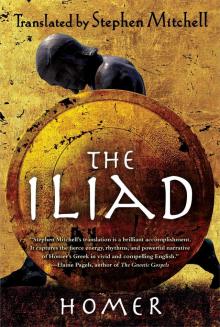 The Iliad
The Iliad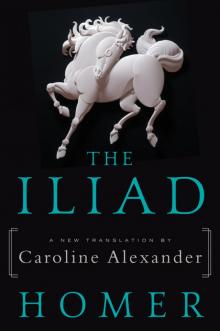 The Iliad (Trans. Caroline Alexander)
The Iliad (Trans. Caroline Alexander)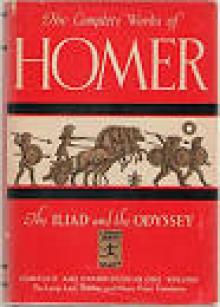 Complete Works of Homer
Complete Works of Homer The <I>Odyssey</I>
The <I>Odyssey</I>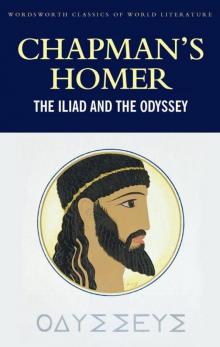 The Iliad and the Odyssey (Classics of World Literature)
The Iliad and the Odyssey (Classics of World Literature)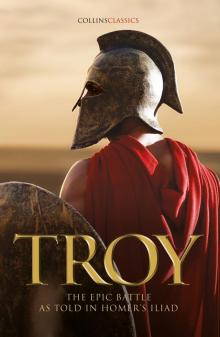 Troy
Troy The Iliad (Penguin Classics)
The Iliad (Penguin Classics) Delphi Poetry Anthology: The World's Greatest Poems (Delphi Poets Series Book 50)
Delphi Poetry Anthology: The World's Greatest Poems (Delphi Poets Series Book 50)